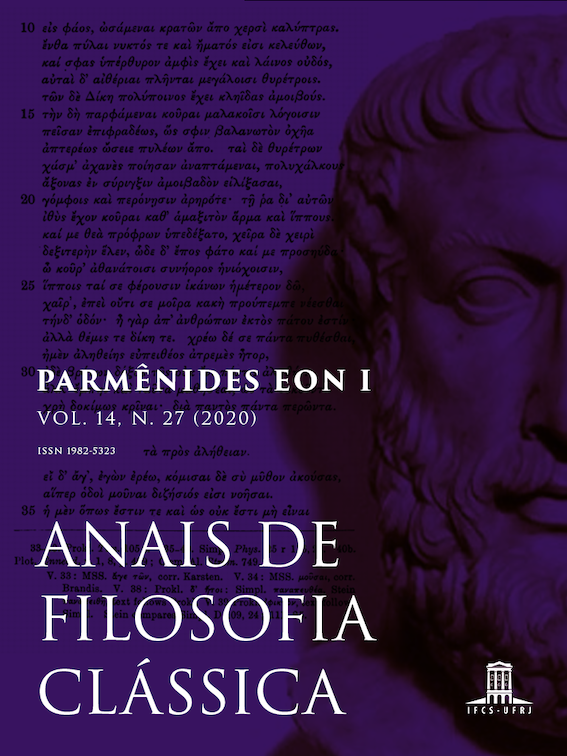Parmenides by himself
DOI:
https://doi.org/10.47661/afcl.v14i27.38773Palavras-chave:
Parmenides, reception, Aristotle, Simplicius, doxa, fact of being, reading order, didactic poetryResumo
In order to know the thought of a philosopher the surest method is to read what he wrote. In the case of the Presocratics, however, a direct unmediated reading of the texts is almost impossible, because the vast majority of works of this period have disappeared. We propose the following methodological procedure concerning the Presocratics in general, and Parmenides in particular: Once a recovered citation (“fragment”) is confirmed as authentic, one must first attach oneself to it and try to pull from it the richest possible meaning. Only by this procedure can one understand the author on his own. The second step is to search for whether there are in a commentator some elements in accordance with the original text that are capable of enriching it.
We first consider Parmenides in his philosophical milieu, then outline the contents of the recovered fragments of his Poem. A Parmenides emerges who differs in many fundamental respects from that portrayed by Aristotle and his school. From an analysis of these fragments unburdened by Aristotelico-Simplician assumptions, we propose a new reading order for the fragments.
Downloads
Referências
BALTUSSEN, Han. Philosophy and Exegesis in Simplicius: The Methodology of a Commentator. London: Duckworth, 2008.
CORDERO, Néstor-Luis. “L'invention de l'école éléatique (Platon, Sophiste, 242d).” In Études sur le "Sophiste" de Platon, ed. P. Aubenque, 91-124. Naples: Bibliopolis, 1991.
CORDERO, Néstor-Luis. “La aristotelización y platonización de Parménides por Simplicio.” Argos 38 (2015): 32-51.
CORDERO, Néstor-Luis. “La Déesse de Parménide, maîtresse de philosophie.” In La naissance de la raison en Grèce, ed. Jean-François Mattéi, 207–14. Paris: Presses universitaires de France, 1990.
CORDERO, Néstor-Luis. “Simplicius et l’école éléate." In Simplicius, sa vie, son oeuvre, sa survie, ed. I. Hadot, 166-182. Berlin/New York: Walther de Gruyter, 1987.
CORDERO, Néstor-Luis, tr. Le Sophiste. Paris: GF-Flammarion, 1993.
ESTIENNE, Henri. Poesis philosophica. Geneva, 1573.
FÜLLEBORN, Georg G. in Fragmente des Parmenides. Züllichau: F. Frommann, 1795
KURFESS, Christopher John. Restoring Parmenides’ Poem: Essays toward a New Arrangement of the Fragments based on a Reassessment of the Original Sources. University of Pittsburgh, 2012.
LAFRANCE, Yvon. La théorie platonicienne de la doxa, Montréal/París: Bellarmin/Les Belles Lettres, 1981.
LICCIARDI, I. A. Critica dell'aparente et critica apparente. Simplicio interprete di Parmenide nel Commentario al De Caelo di Aristotele.Sankt-Augustin: Academia, 2017.
LICCIARDI, I. A. Parmenide tràdito, Parmenide tradìto nel Commentario de Simplicio alla Fisica di Aristotele. Sankt Augustin: Academia, 2016.


